高考英语同位语从句grammar课件(22张ppt)
文档属性
| 名称 | 高考英语同位语从句grammar课件(22张ppt) | 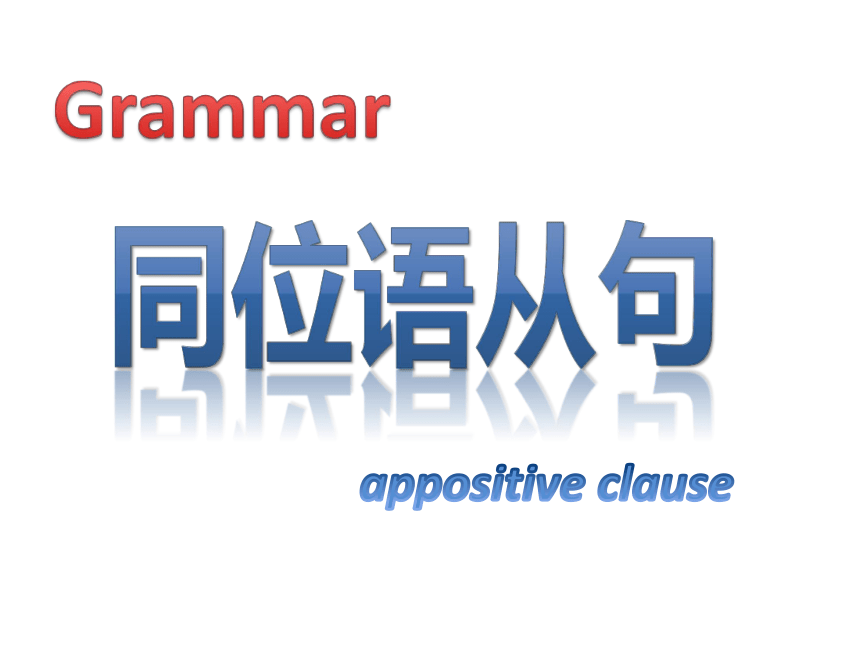 | |
| 格式 | zip | ||
| 文件大小 | 1.4MB | ||
| 资源类型 | 教案 | ||
| 版本资源 | 人教版(2019) | ||
| 科目 | 英语 | ||
| 更新时间 | 2023-02-10 21:19:32 | ||
图片预览

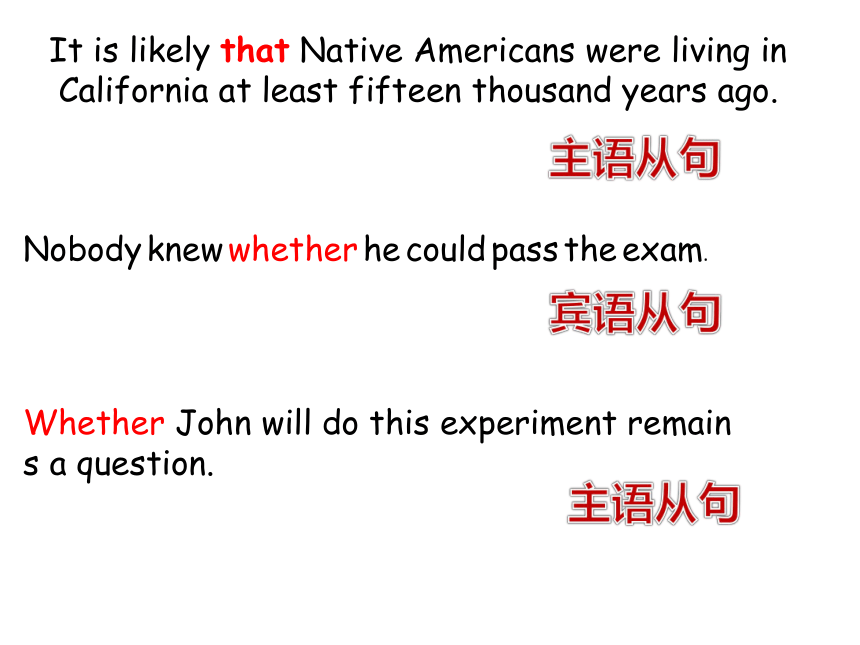
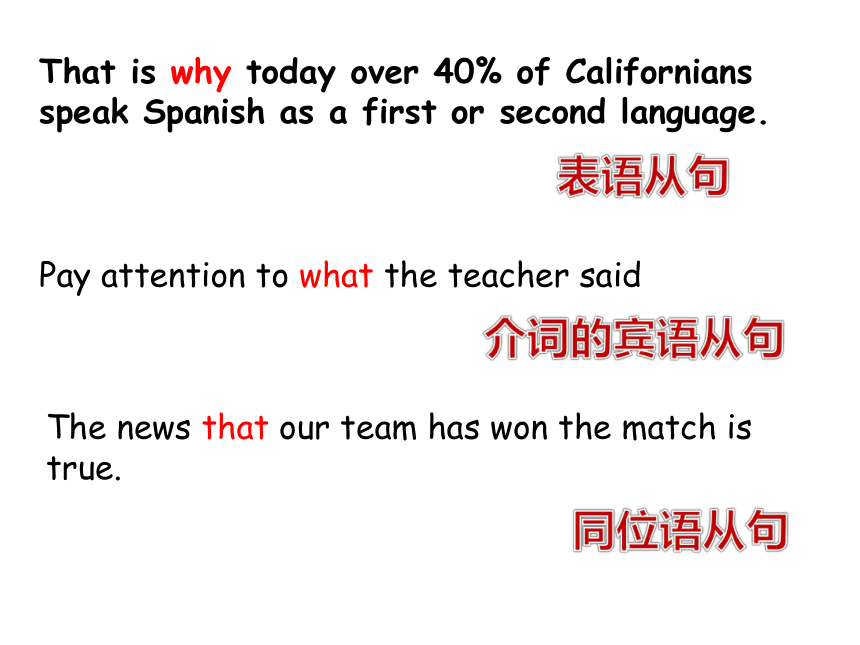
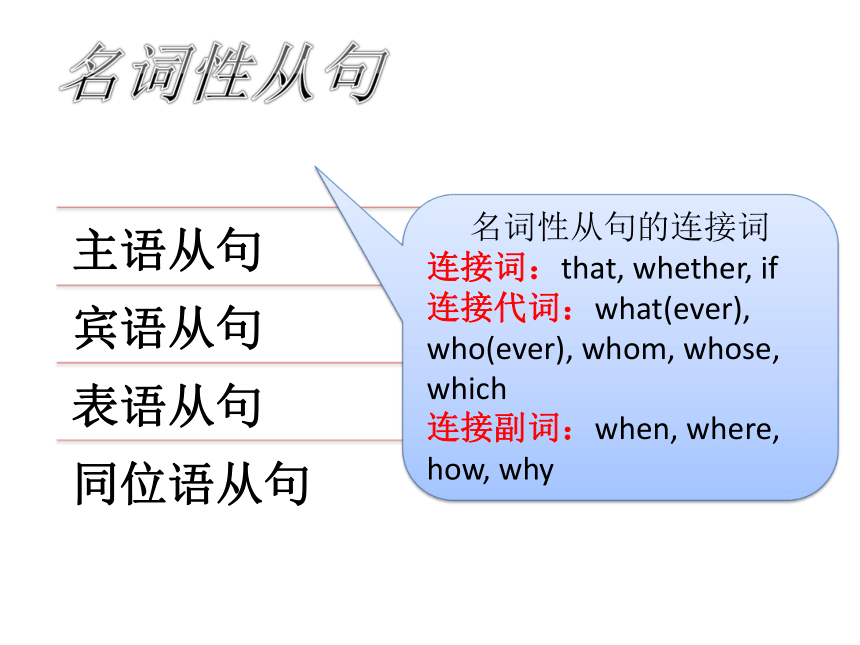
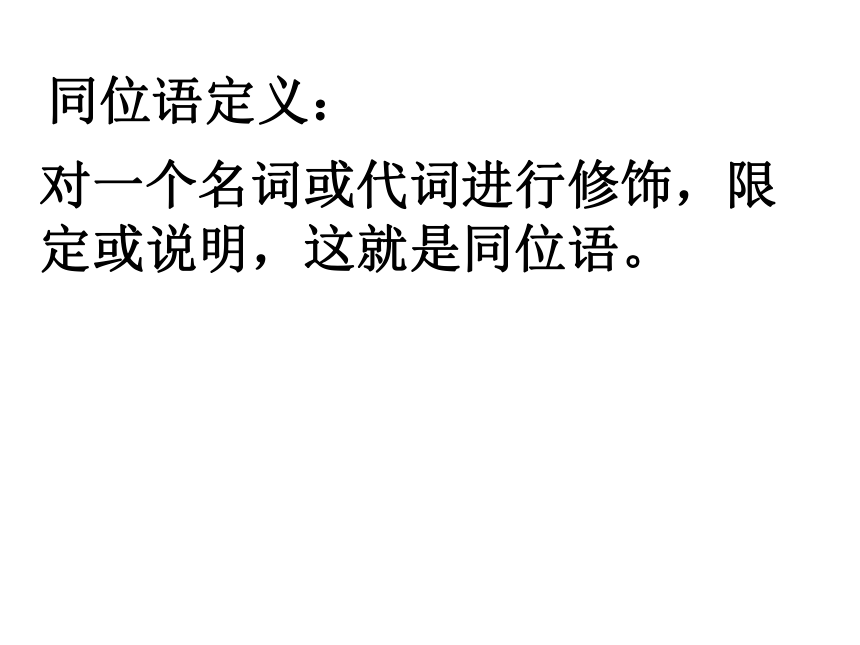
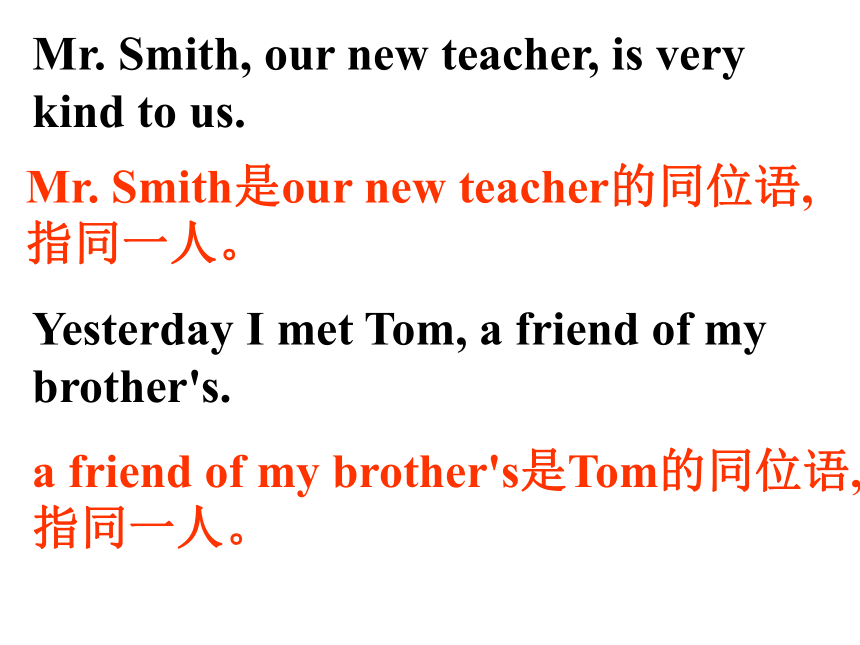
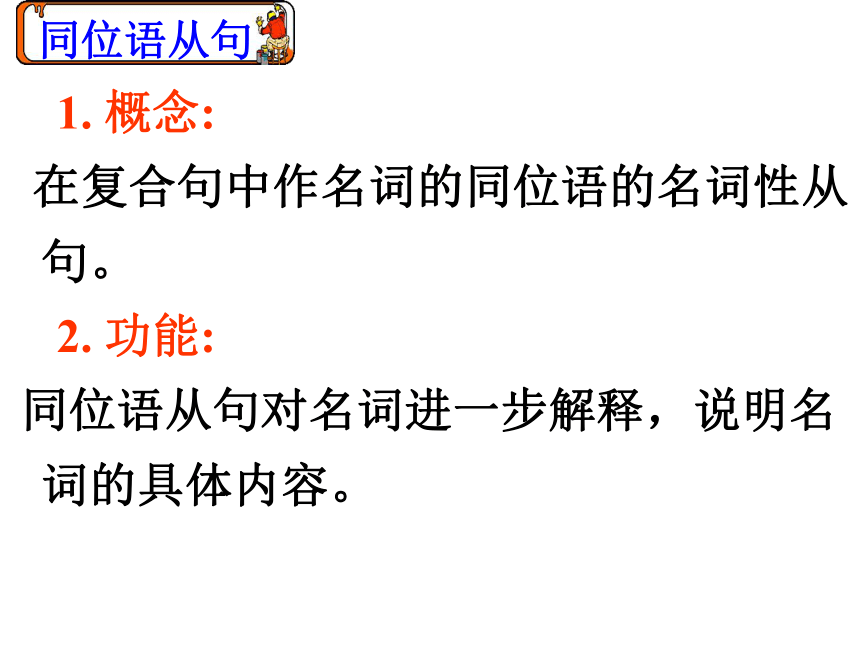
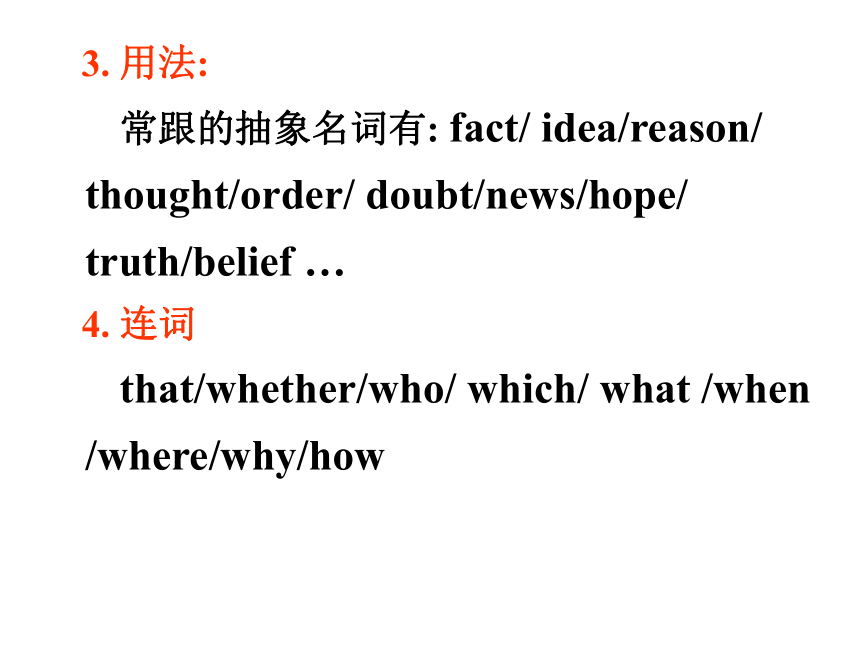
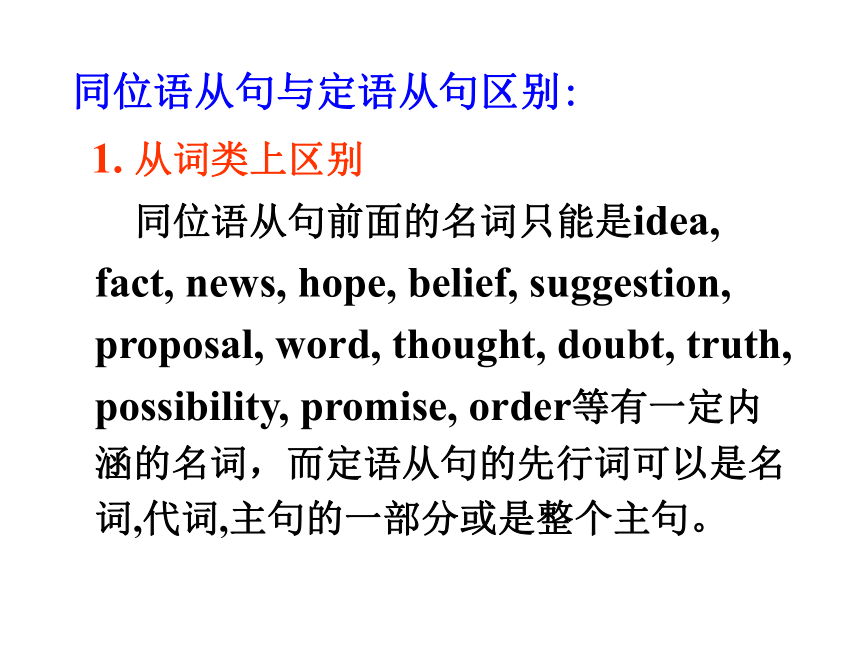
文档简介
(共22张PPT)
Whether John will do this experiment remains a question.
Nobody knew whether he could pass the exam.
That is why today over 40% of Californians speak Spanish as a first or second language.
Pay attention to what the teacher said
The news that our team has won the match is true.
名词性从句的连接词
连接词:that, whether, if
连接代词:what(ever), who(ever), whom, whose, which
连接副词:when, where, how, why
对一个名词或代词进行修饰,限定或说明,这就是同位语。
同位语定义:
Mr. Smith, our new teacher, is very kind to us.
Mr. Smith是our new teacher的同位语,指同一人。
Yesterday I met Tom, a friend of my brother's.
a friend of my brother's是Tom的同位语,指同一人。
同位语从句
1. 概念:
在复合句中作名词的同位语的名词性从句。
2. 功能:
同位语从句对名词进一步解释,说明名词的具体内容。
3. 用法:
常跟的抽象名词有: fact/ idea/reason/ thought/order/ doubt/news/hope/ truth/belief …
4. 连词
that/whether/who/ which/ what /when /where/why/how
同位语从句与定语从句区别:
1. 从词类上区别
同位语从句前面的名词只能是idea, fact, news, hope, belief, suggestion, proposal, word, thought, doubt, truth, possibility, promise, order等有一定内涵的名词,而定语从句的先行词可以是名词,代词,主句的一部分或是整个主句。
He told me the news that he would come home from aboard soon.
Word came that he had been abroad.
据说他已经出国了。
Our team has won the game, which made us very happy.
我们的队赢了, 这让我们很高兴。
(定语从句)
(同位语从句)
2.从性质上区别
定语从句是从句对其先行词的修饰或限制,属于形容词性从句的范畴;而同位语从句是从句对前面抽象名词的进一步的说明和解释,属于名词性从句的范畴,如:
The news that our team has won the game was true.
我们队赢了那场比赛的消息是真的。
(同位语从句, 补充说明news到底是一个什么消息)
The news that he told me yesterday was true.
昨天他告诉我的那个消息是真的。
(定语从句, news在从句中作told的宾语)
3. 从引导词及其在句子中的成分上区别
有些引导词如how, whether, what 可以引导同位语从句, 但不能引导定语从句。
如: That question whether we need it has not been considered.
我们是否需要它这个问题还没有考虑。
(同位语从句)
引导词that引导定语从句时, 在从句中一般作主语或宾语 (指物时还可以用which代替), 并且作宾语时常常省略,that在同位语从句中仅起连接作用, 不充当任何成分, 并且不能省略, 也不能用which来代替,如:
The order that we should send a few people to help the other groups was received yesterday.
我们应派几个人去帮别的几个小组的命令昨天收到了。
(同位语从句, 是对order的具体解释, that虽不作成分, 但不能省略)
The order that we received yesterday was that we should send a few people to help the other groups.
我们昨天收到的命令是我们应该派几个人去帮助别的几个小组。
(定语从句, 是名词order的修饰语, that在从句中作received的宾语, 可以省略)
回顾总结:
在复合句中用作同位语的从句称为同位语从句。
eg. Everybody knows the fact that the sun rises from the east.
1.同位语从句的连词 同 主语从句的连词
2. 同位语从句常放在抽象名词之后,说明该名词的具体内容。
fact , news, idea, hope , word, truth, promise, question ,order ,reply , belief, doubt, problem, suggestion.
3. 陈述语序
Translate into Chinese
1. I can’t answer the question where I’ll go after graduation.
2. The news that he has gone to a company for a better job is not true.
3. He has no idea when he will tell his mother the bad news.
4. There is no doubt that he knows everything about it.
5. The fact that the sea water cannot
be used for drinking is known to all.
翻译下列句子
1 我们明天是否会去看电影的问题还没有决定。
2 昨天台湾发生了地震的消息是真的。
3 我们听说了他女儿离开家的消息。
4 外国客人将要参观我们学校的消息是真实的。
5 他表达了他想再次来中国的愿望。
1). The reason ________ we didn't trust him is ________ he has often lied.
2). I have no idea __________ he has gone.
3). She didn’t tell the truth _____________ she managed to go abroad.
4).It is still uncertain _____________he is coming or not.
5).I wonder ____________ she refused my invitation.
why
where
that
whether
how
why
1.Mike made a promise __________________________________________ . (他将帮助我学习英语)
2. That is___________________________________. 那就是我想要对你讲的。
3. _________________________________is the best news I have heard this long time.
你将来伦敦是长久以来我听到的最好消息。
4. I hoped_____________________________________.
我曾希望我会成功。
5. I have no idea______________________________________.
我不知道他什么时候回来。
that he would help me with my English
what I want to tell you
That you are coming to London
(that) I would succeed
when he will come back
Whether John will do this experiment remains a question.
Nobody knew whether he could pass the exam.
That is why today over 40% of Californians speak Spanish as a first or second language.
Pay attention to what the teacher said
The news that our team has won the match is true.
名词性从句的连接词
连接词:that, whether, if
连接代词:what(ever), who(ever), whom, whose, which
连接副词:when, where, how, why
对一个名词或代词进行修饰,限定或说明,这就是同位语。
同位语定义:
Mr. Smith, our new teacher, is very kind to us.
Mr. Smith是our new teacher的同位语,指同一人。
Yesterday I met Tom, a friend of my brother's.
a friend of my brother's是Tom的同位语,指同一人。
同位语从句
1. 概念:
在复合句中作名词的同位语的名词性从句。
2. 功能:
同位语从句对名词进一步解释,说明名词的具体内容。
3. 用法:
常跟的抽象名词有: fact/ idea/reason/ thought/order/ doubt/news/hope/ truth/belief …
4. 连词
that/whether/who/ which/ what /when /where/why/how
同位语从句与定语从句区别:
1. 从词类上区别
同位语从句前面的名词只能是idea, fact, news, hope, belief, suggestion, proposal, word, thought, doubt, truth, possibility, promise, order等有一定内涵的名词,而定语从句的先行词可以是名词,代词,主句的一部分或是整个主句。
He told me the news that he would come home from aboard soon.
Word came that he had been abroad.
据说他已经出国了。
Our team has won the game, which made us very happy.
我们的队赢了, 这让我们很高兴。
(定语从句)
(同位语从句)
2.从性质上区别
定语从句是从句对其先行词的修饰或限制,属于形容词性从句的范畴;而同位语从句是从句对前面抽象名词的进一步的说明和解释,属于名词性从句的范畴,如:
The news that our team has won the game was true.
我们队赢了那场比赛的消息是真的。
(同位语从句, 补充说明news到底是一个什么消息)
The news that he told me yesterday was true.
昨天他告诉我的那个消息是真的。
(定语从句, news在从句中作told的宾语)
3. 从引导词及其在句子中的成分上区别
有些引导词如how, whether, what 可以引导同位语从句, 但不能引导定语从句。
如: That question whether we need it has not been considered.
我们是否需要它这个问题还没有考虑。
(同位语从句)
引导词that引导定语从句时, 在从句中一般作主语或宾语 (指物时还可以用which代替), 并且作宾语时常常省略,that在同位语从句中仅起连接作用, 不充当任何成分, 并且不能省略, 也不能用which来代替,如:
The order that we should send a few people to help the other groups was received yesterday.
我们应派几个人去帮别的几个小组的命令昨天收到了。
(同位语从句, 是对order的具体解释, that虽不作成分, 但不能省略)
The order that we received yesterday was that we should send a few people to help the other groups.
我们昨天收到的命令是我们应该派几个人去帮助别的几个小组。
(定语从句, 是名词order的修饰语, that在从句中作received的宾语, 可以省略)
回顾总结:
在复合句中用作同位语的从句称为同位语从句。
eg. Everybody knows the fact that the sun rises from the east.
1.同位语从句的连词 同 主语从句的连词
2. 同位语从句常放在抽象名词之后,说明该名词的具体内容。
fact , news, idea, hope , word, truth, promise, question ,order ,reply , belief, doubt, problem, suggestion.
3. 陈述语序
Translate into Chinese
1. I can’t answer the question where I’ll go after graduation.
2. The news that he has gone to a company for a better job is not true.
3. He has no idea when he will tell his mother the bad news.
4. There is no doubt that he knows everything about it.
5. The fact that the sea water cannot
be used for drinking is known to all.
翻译下列句子
1 我们明天是否会去看电影的问题还没有决定。
2 昨天台湾发生了地震的消息是真的。
3 我们听说了他女儿离开家的消息。
4 外国客人将要参观我们学校的消息是真实的。
5 他表达了他想再次来中国的愿望。
1). The reason ________ we didn't trust him is ________ he has often lied.
2). I have no idea __________ he has gone.
3). She didn’t tell the truth _____________ she managed to go abroad.
4).It is still uncertain _____________he is coming or not.
5).I wonder ____________ she refused my invitation.
why
where
that
whether
how
why
1.Mike made a promise __________________________________________ . (他将帮助我学习英语)
2. That is___________________________________. 那就是我想要对你讲的。
3. _________________________________is the best news I have heard this long time.
你将来伦敦是长久以来我听到的最好消息。
4. I hoped_____________________________________.
我曾希望我会成功。
5. I have no idea______________________________________.
我不知道他什么时候回来。
that he would help me with my English
what I want to tell you
That you are coming to London
(that) I would succeed
when he will come back
